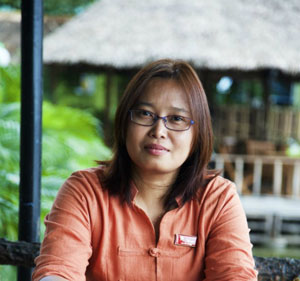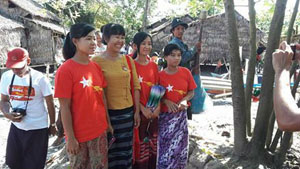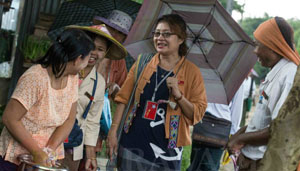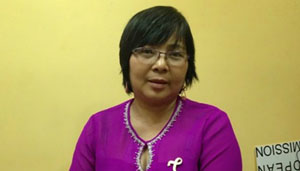RANGOON — A total of 791 women will be contesting Burma’s Nov. 8 general election, out of more than 6,000 candidates. While that amounts to only about 15 percent of candidates, the upcoming poll could offer Burma a chance to put more women into power. That would be a welcome change for a country where women currently occupy less than five percent of parliamentary seats and very few cabinet positions.
Only two women serve as Union ministers, Myat Myat Ohn Khin, who heads the Ministry of Social Welfare, Relief and Resettlement, and Khin San Yi of the Ministry of Education. With 36 government ministries, that’s not a very strong showing. While the appointments of both women were a welcome step toward greater empowerment, neither appointee has brought about significant observable to change through their respective ministries.
A new law to prevent violence against women, drafted on the initiative of the Ministry of Social Welfare in collaboration with civil society, has yet to reach Parliament. In its stead, a package of so-called “race and religion protection laws,” widely viewed as discriminatory against women and religious minorities, swept easily through the legislature.
Meanwhile, a new National Education law drawn up in part by the Ministry of Education courted voracious criticism from students and educators for elements of the law viewed as undemocratic. That law also made its way through Parliament, while scores of student demonstrators who opposed it remain behind bars.
Of the nearly 800 women selected as candidates, about 500 of them are running for opposition parties rather than for the ruling Union Solidarity and Development Party (USDP) or smaller parties widely viewed as establishment proxies. The National League for Democracy (NLD), Burma’s main opposition party, will run 150 candidates in 1120 races, as compared to the USDP’s 72 in 1,134.
While women account for only 15 percent of the NLD’s candidates, the party still has a better record than some of its adversaries. Other parties, such as the National Unity Party (NUP) and the National Development Party (NDP), are also making efforts to include women among their ranks. The NUP, a viewed as a proxy of the USDP, is fielding 85 of about 750 candidates—about 11 percent. The NDP, an opposition party founded by former presidential advisor Nay Zin Latt, will run about 60 women in more than 350 races—about 19 percent.
What’s clear is not only that opposition parties are fielding more women than the establishment, but also that those women are more likely to bring about progressive policies. Of Burma’s two current female ministers, both are aligned with the establishment, and neither has proven to be a strong advocate for women’s rights. A number of women in this year’s poll make for strong candidates with a lot of positive potential. With more women in the running, the atmosphere on the Parliament floor is likely to change. Politically-minded, well educated, progressive women could usher in a current of change to the male-dominated legislature, 25 percent of which is reserved for the military.
Many of this year’s candidates spent years in prison because of their political activity under the former military regime. Among them are vocal opponents of laws that violate human rights and women’s freedoms, who have long devoted themselves to gender equity, justice and peace.
Below is a brief look at the work and lives of a small sampling of those women. Mothers, teachers, activists and more, they offer a sense of what women can bring to the political conversation in this country, and serve as an inspiration to young voters and future leaders.
Zin Mar Aung
Prominent activist Zin Mar Aung will contest a seat for the Lower House in Rangoon’s Yankin Township for the National League for Democracy (NLD), the main opposition party chaired by Nobel Laureate Aung San Suu Kyi.

Imprisoned for 11 years following her involvement in the 1996 and 1998 pro-democracy movements, the seasoned rights advocate later founded the Rainfall Gender Study Group, which encourages greater women’s participation in Burma’s democratic transition. She has been an active voice against the “race and religion protection laws,” prompting death threats and hate mail from Buddhist nationalists.
“The democratic transition needs forces in Parliament that can work for real change, that’s why I entered the election,” Zin Mar Aung told The Irrawaddy. “It’s hard to say how much we can achieve if we win, but one thing that’s sure is that there will be less torture, threats and oppression of the public.”
Zin Mar Aung was a 2012 recipient of the International Women of Courage Award, presented by then-US Secretary of State Hillary Clinton, and was honored as a Young Global Leader in 2014 by the World Economic Forum.
Nyo Nyo Thin
Known as one of a handful of outspoken lawmakers in Burma, independent legislator Nyo Nyo Thin has never failed to take a stand against the Rangoon divisional government on controversial issues in the regional parliament—notably opposing a divisive Rangoon city expansion plan and now-defunct developments near the Shwedagon Pagoda.

She is now running again in her Bahan constituency, but this time for a seat in the Lower House. Nyo Nyo Thin said there is a lot of work to do at the national level, as many laws are sorely in need of amendment or annulment.
“If the government is corrupt, you can use me as a knife. My greatest desire is to fight against corruption in government,” she told The Irrawaddy earlier this year.
Prior to 2010, Nyo Nyo Thin earned her doctorate in law at Yokohama National University in Japan, and pursued her postdoctoral studies at the Peace and Governance Program at Tokyo’s United Nations University.
Htoot May
Ethnic Arakanese candidate Htoot May, who has been an active politician since she joined the Arakan League for Democracy (ALD) more than a decade ago, enters the election as an Upper House candidate representing the Arakan National Party (ANP) in the western state’s Ann and Ramree townships.

After Arakan State’s two dominant political parties—the Rakhine Nationalities Development Party and the ALD—merged in 2014, she became an executive member of the ANP representing Rangoon Division. She was also one of 18 pioneering figures from Burma to join the Liberty and Leadership Forum hosted by the Bush Institute in 2014-15.
“I believe that federalism and ethnic equality must flourish, as well as the democratic system. My generation, having grown up under military rule, did not have the chance to learn about democratic processes,” Htoot May said. “I would like to work for the younger generation that could experience democratic standards, which guarantee freedom of speech and federalism.”
Ma Thandar
Award-winning human rights defender Ma Thandar, widow of a journalist killed last year in the custody of the Burma Army, is contesting a Lower House seat representing Irrawaddy Division’s Einme Township as a member of the NLD.

Her husband, Aung Kyaw Naing—also known as Par Gyi—was a freelance journalist covering conflict in southeastern Burma late last year when he was apprehended and later killed. Two soldiers tried over involvement in his death were acquitted by a military tribunal earlier this year.
Despite her efforts, Ma Thandar has thus far been unable to secure justice for her husband’s untimely death, and in early September announced that she would focus her attention on the greater good by entering politics.
Ma Thandar’s awareness programs help rural farmers better understand land laws, while her work with the Democracy and Peace Women’s Network centers on human rights and campaigns against domestic violence.
“We want to advocate for and work with women who farm in the villages, to show them how to manage money and income,” she told The Irrawaddy in June. “We would like to educate women on law and regulations, as well as the dangers of mortgages.”
Cherry Zahau
Human rights activist Cheery Zahau seeks a seat in Chin State’s Falam Township for the Lower House, representing the Chin Progressive Party (CPP).

A member since 2012, she currently serves as one of the party’s three secretaries. Prior to entering party politics, Zahau spent more than a decade advocating for human rights, women’s rights and empowerment, development, peace and human resources in the remote northwestern state.
If elected, Zahau said she will aim improve local job opportunities for women and youth, as well as negotiating better transport and telecommunications infrastructure.
“We can’t leave women’s rights for later,” she said, “we need to deal with this at the same time as other issues.”
Susanna Hla Hla Soe

Susanna Hla Hla Soe, best known for her work as director of the Karen Women’s Action Group (KWAG), will run for an Upper House seat in Rangoon’s Mingalardon and Insein townships. She is seeking election on the NLD ticket.
A well-known voice for women’s empowerment and child protection, Hla Hla Soe has also played an influential role in microfinance, disaster relief and preparedness and anti-human trafficking efforts.
In 2012, she became the first person from Burma to receive a humanitarian award from US-based NGO InterAction for her work on disaster relief and sustainable development.
Shwe Shwe Sein Latt
As founder and director of Phan Tee Ein (Burmese for Creative House), Shwe Shwe Sein Latt aims to rehabilitate the lives of women who have survived sexual violence. She now hopes to take those issues to the national stage as a member of the Upper House, representing Dike Oo, Waw and Shwe Kyin townships in Pegu Division for the NLD.

Phan Tee Ein has recently broadened its scope to offer leadership training for vulnerable women, allowing participants to network both within Burma and abroad. Shwe Shwe Sein Latt said this work serves to demonstrate her commitment to women’s empowerment, an issue she hopes to bring into the nation’s grossly lopsided legislature.
In terms of how she might create a more gender just society, Shwe Shwe Sein Latt said she would focus on extending more job opportunities for women so they can support themselves. Pointing out that the female population in Burma is greater than that of men, she said that she would initially aim to create more jobs for women, and gradually increase their median income.
Nang Mya Oo

Joint secretary of the Shan Literature and Culture Association in Taunggyi, Nang Mya Oo will contest a seat in the Shan State legislature for the Shan Nationalities League for Democracy (SNLD).
As the party’s chief of women’s affairs, the ethnic Shan candidate has underscored the affects of war on women and the challenges unique to internally displaced persons (IDPs), particularly women who fled their homes with children. She has also been an active voice for stronger safeguards against sexual violence.
“As a mother, I really hate hearing of rape cases against children. Offenders dare to do it because there are no harsh sentences, so we need an effective penalty to punish them,” she said. “Another matter is violence against women, even in their homes. We need to prevent this.”
Editor’s note: Additional data about women’s candidacy reflective of party affiliation was added to this article on Oct. 27.

















